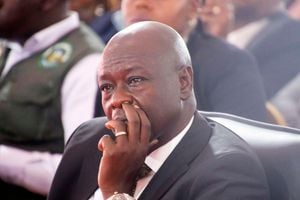Victorious parties in August poll set for a Sh2bn windfall

Registrar of Political Parties Ann Nderitu.
Political parties that win the most seats in the August General Election will get a lion’s share of the Sh2.13 billion the National Assembly has approved to fund the outfits, in what could push leading presidential candidates to work even harder for the numbers.
The allocation for the 2022/23 budget window is, however, still way below the requirements of the law but a significant boost compared to the allocations in previous years.
Section 24 of the Political Parties Act establishes the political parties’ fund to be administered by the Office of the Registrar of Political Parties (ORPP). The law also provides that at least 0.3 per cent of the most recent audited revenue accounts of the national government as approved by the National Assembly be allocated to the kitty.
Special interest
The most recent audited revenue accounts of the national government as approved by the National Assembly are the accounts for the 2017/18 financial year. At least Sh1.65 trillion was collected to the kitty, which means that, on the basis of 0.3 per cent, the parties’ fund should have had at least Sh5 billion annually from the 2017/18 period.
With the amendments to the law early this year, 95 per cent of the fund is to be shared among the qualifying parties based on the number of votes secured in the preceding General Election, number of candidates from special interest groups elected and number of elected representatives.
Five per cent of the fund is allocated to the ORPP for administrative expenses.
ORPP records show that, although there are 87 fully registered political parties in Kenya, only 81 have registered to contest in the August 9 General Election. This is not a guarantee that all of them will benefit from the fund.
The law stipulates that a political party is not entitled to funding from the exchequer if more than two-thirds of its registered office bearers are of the same gender and if the party does not have in its governing body representation of special interest groups.
A party does not also qualify to access the kitty if it does not have an elected member in the Senate, National Assembly, an elected governor or Member of the County Assembly.
Yesterday Registrar of Political Parties Ann Nderitu said that, while the allocation is an improvement, it’s still way below the threshold as per the law, notwithstanding the revised allocation criteria. “The allocation is still little but to be fair, it is a step in the right direction,” Ms Nderitu said.
She added that the increased allocation didn’t come easy.
“We’ve really lobbied, and given the expanded criteria of sharing the kitty, it’s good news as many qualifying parties may get a share of the funds subject to meeting the funding requirements,” the ORPP boss noted.
To qualify for funding, the criterion is that 70 per cent of the fund shall be distributed proportionately by reference to the total number of votes secured by each political party in the preceding General Election.
There is also 15 per cent that shall be distributed proportionately to parties based on the number of candidates from special interest groups elected in the preceding General Election, and10 per cent of the fund proportionately shared based on the number of representatives elected in the preceding General Election.
Five per cent of the fund shall be used by the ORPP for administrative expenses.
The funds shall be shared as outlined in the law and shall be accounted for in line with the “principles of prudential financial management” of public funds.
Despite the legal provisions, the allocation to the parties’ fund has been way below the requirements.
In the 2013/14 financial year, Sh205.2 million was allocated, 2014/15 Sh300 million, 2015/16 Sh367.2 million, 2016/17 Sh370.5 million and 2017/18, the year when Ms Nderitu was appointed the registrar in an acting capacity, Sh371.2 million was allocated.
Own revenues
During the 2018/19 financial year, Sh671.2 million was allocated, 2019/20 Sh871.2 million, 2020/21 Sh995.24 million and 2021/22, the current financial year, Sh1.48 billion was allocated.
Interestingly, only the Orange Democratic Movement and Jubilee Party qualified for the funds as they were the only parties that met the requirements based on the regime that existed before the law was amended early this year to change the criteria.
Before the law was amended, parties needed to get at least five per cent of the votes in the preceding General Election calculated on the basis of aggregating all the votes a party secures in the presidential election, governorship, senatorial, members of the National Assembly and members of the county assemblies.
Parties are also encouraged to generate their own revenues from recognised sources that may include membership subscriptions, contributions and donations.





